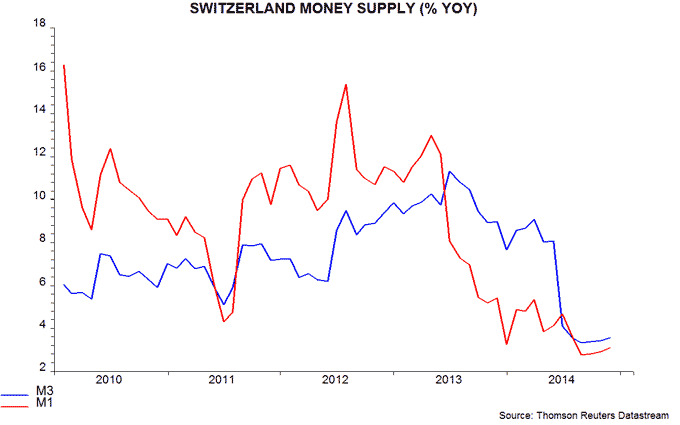Swiss currency shock wrecks promising economic outlook
Yesterday’s shock decision by the Swiss National Bank (SNB) to abandon the 1.20 floor for the euro / franc rate was strange in several respects.
Fixed currency arrangements usually break down because the effort to maintain them has produced excessively restrictive or loose domestic monetary conditions. The Swiss monetary and economic backdrop, however, is benign. GDP grew by a respectable 1.9% in the year to the third quarter while domestic prices – as measured by the GDP deflator – were stable. Unemployment of 3.1% is close to its 10-year average. Monetary growth is subdued, with M3 and M1 up by 3.6% and 3.1% respectively in the year to November – see chart.
The SNB suggested yesterday that the franc’s recent weakness against the US dollar warranted allowing it to appreciate against the euro. Yet the effective exchange rate, as of Wednesday’s close, was slightly higher than a year ago. There was no depreciation to correct.
The SNB was concerned that the franc would be dragged lower by a further fall in the euro, suggesting that it expects the ECB to surprise markets with a large-scale QE package next week. Even if this scenario plays out, however, there is no obvious advantage in the SNB acting before the event.
It has been claimed that the SNB was constrained from conducting foreign exchange intervention on the necessary scale because of the size of its balance sheet, with assets currently equal to 84% of annual GDP. Any such constraint must be political rather than economic – the monetary authority of a strong currency can accumulate reserves without limit.
If Japan followed Switzerland’s accounting practice of including official currency reserves on the central bank’s balance sheet, the Bank of Japan’s assets would be 94% of GDP currently, with a further significant increase planned.
Nor was the SNB out of interest rate ammunition, as yesterday's 0.5 percentage point cut in target rates shows.
The SNB was wrong to abandon its traditional emphasis on domestic monetary stability in favour of an exchange rate target in 2011, but yesterday’s volte face was ill-timed, lacks a convincing rationale and will inflict significant short-term economic pain.

Reader Comments